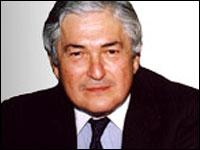James D. Wolfensohn has made sustainable poverty reduction the World Bank Group's overarching mission since he became the World Bank's president June 1, 1995. Mr. Wolfensohn was appointed to a second, five-year term on September 27, 1999, making him the third president in Bank history to be reappointed by the Bank's Board of Executive Directors.
Prior to joining the Bank, Mr. Wolfensohn established his career as an international investment banker with a parallel involvement in development issues and the global environment.
In his nine years as President, Mr. Wolfensohn has traveled to more than 120 countries to better understand the challenges facing the Bank's 184 member countries. In addition to visiting development projects, he has met with the Bank's government clients and representatives from business, labor, media, non-governmental organizations, religious and women's groups, students, and teachers.
Under Mr. Wolfensohn's leadership, the World Bank Group has redoubled its efforts to monitor and combat corruption, give voice to clients living in poor communities, and magnify the return on development investments, including sponsoring a global dialogue on Scaling Up Poverty Reduction, which culminated in a major conference in Shanghai in May 2004.
Further, during Mr. Wolfensohn's tenure, the Bank has become the largest external financier of primary education, basic health, HIV/AIDS programs, the environment and biodiversity.
Internally, Mr. Wolfensohn has transformed the World Bank Group, greatly increasing decentralization, bringing the Bank forward technologically, and turning it into a far more open and transparent organization. Externally, Mr. Wolfensohn has helped forge strategic partnerships around culture and peace, faith and development, and communications technology, including the Global Distance Learning Network and the Development Gateway.
The Bank's original mandate of post-conflict reconstruction became an increasing focus from the late 1990s to today, with the institution becoming involved in war-torn areas from Afghanistan to Bosnia to Rwanda. Understanding that poverty cannot be eliminated without peace, Mr. Wolfensohn has encouraged further exploration of the linkages between economic opportunity and human security, with the idea that increasing social and economic stability can foster the prevention of conflict.
In a speech to the 2003 World Bank/IMF Annual Meeting in Dubai, Mr. Wolfensohn highlighted the growing gap between “the haves and have-nots” between and within countries. He called for “a new global balance” with donor and developing nations both taking urgent steps to ensure the United Nations Millennium Development Goals are met.
”We must rebalance our world to give everyone the chance for life that is secure,” Mr. Wolfensohn said, “'with a right to expression, equal rights for women, rights for the disabled and disadvantaged, the right to a clean environment, the right to learn, the right to development.
In September 2003, Mr. Wolfensohn participated in a dialogue with 100 youth leaders from 70 countries whose organizations represent more than 120 million members worldwide—among them rural youth, street children, children orphaned by AIDS and civil conflict, Roma youth, and youth with disabilities. Mr. Wolfensohn noted that while people under 25 already account for more than half the population in most developing countries, their concerns, which commonly include education and unemployment, are not being given the urgency required to build a more secure world. The Bank is now establishing youth teams in Bank offices, and advocating for more active engagement of youth, including in developing anti-poverty strategies.
In 1999, Mr. Wolfensohn introduced the Comprehensive Development Framework or CDF, emphasizing country ownership of poverty reduction strategies and strong partnerships among government, civil society, and the private sector. The CDF called for a broader approach to development, moving beyond economics and stressing social concerns as equally important to tackling poverty.
In 1996, the World Bank and International Monetary Fund launched the Heavily Indebted Poor Countries Initiative, or HIPC, the first comprehensive debt reduction program. As of August 2004, 27 of the world's poorest countries were receiving substantial debt relief under the program that will amount, over time, to more than $53 billion.
Before joining the Bank, Mr. Wolfensohn was President and Chief Executive Officer of James D. Wolfensohn Inc, an investment firm that advised major international and U.S. corporations. He relinquished his interests in the firm upon joining the Bank. Mr. Wolfensohn served as Executive Partner of Salomon Brothers in New York and head of its investment-banking department, Executive Deputy Chairman and Managing Director of Schroeder's Ltd in London, President of J. Henry Schroeder's Banking Corporation in New York, and Managing Director, Darling & Co of Australia.
Mr. Wolfensohn has participated in a wide range of cultural and volunteer activities throughout his life, especially the performing arts. In 1970, he became involved in New York 's Carnegie Hall, first as a board member and later, from 1980 to 1991, as Chairman of the Board. During this time, he led its successful effort to restore the landmark New York building. He is now Chairman Emeritus of Carnegie Hall. In 1990, Mr. Wolfensohn also became Chairman of the Board of Trustees of the John F. Kennedy Center for the Performing Arts in Washington. On January 1, 1996, he was elected Chairman Emeritus.
Mr. Wolfensohn has been President of the International Federation of Multiple Sclerosis Societies and Director of the Business Council for Sustainable Development. He also served both as Chairman of the Finance Committee and Director of the Rockefeller Foundation and of the Population Council, and as a member of the Board of Rockefeller University.
In addition to serving as President of the World Bank Group, he is Chairman of the Board of the Institute for Advanced Study at Princeton. Mr. Wolfensohn is also an Honorary Trustee of the Brookings Institution and a member of the Council on Foreign Relations and the Century Association in New York.
Born in Australia on December 1, 1933, Mr. Wolfensohn is a naturalized United States citizen. He holds a BA and LLB from the University of Sydney and an MBA from the Harvard Graduate School of Business.
Prior to attending Harvard, Mr. Wolfensohn was a lawyer in the Australian law firm of Allen Allen Hemsley. He served as an officer in the Royal Australian Air Force, and was a member of the 1956 Australian Olympic Fencing Team.
Mr. Wolfensohn is a Fellow of the American Academy of Arts and Sciences and a Fellow of the American Philosophical Society. He has been the recipient of many awards for his volunteer work, including the first David Rockefeller Prize of the Museum of Modern Art in New York for his work for culture and the arts.
In May 1995, he was awarded an Honorary Knighthood by Queen Elizabeth II for his contribution to the arts. The governments of Australia, France, Germany, Morocco, Norway, and Russia have also decorated him.
He and his wife, Elaine, an education specialist and a graduate of Wellesley, BA, and Columbia University, MA and MEd, have three children—Sara, Naomi, and Adam.
James D. Wolfensohn appears in the following:
James Wolfensohn: A Global Life
Tuesday, October 12, 2010
Former president of the World Bank James D. Wolfensohn discusses his life and work, and his new book A Global Life: My Journey Among Rich and Poor, from Sydney to Wall Street to the World Bank.
American Composers
Sunday, July 04, 2010
In this July 4th special edition, we will explore music by American composers – works chosen by 11 of our guests including Tom Brokaw, Condoleezza Rice, Alan Alda and Renée Fleming.
James Wolfensohn, President of the World Bank
Sunday, June 05, 2005
As James Wolfensohn steps down as President of the World Bank to become a Special Envoy to assist with Israel's planned withdrawal from the Gaza Strip, he still focuses on his favorite composers – Bernstein, Mahler, Schumann and Bach.


